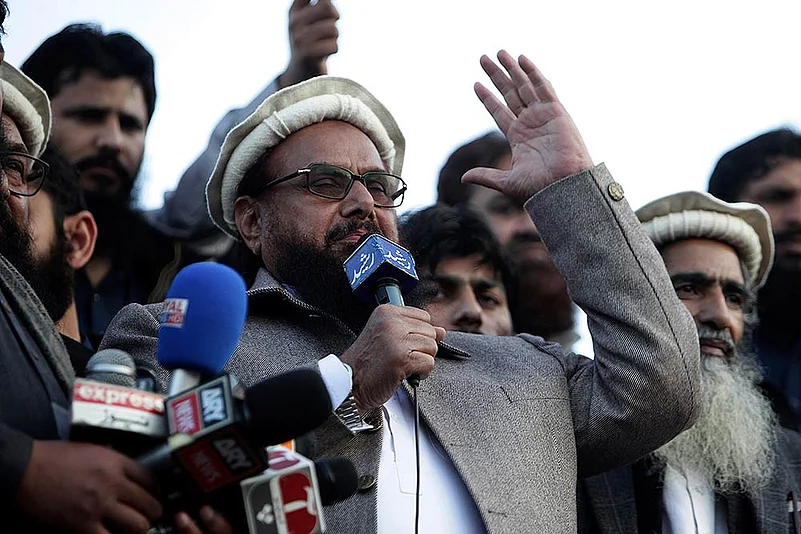The arrest of Jamaat-ud-Dawa (JuD) chief Hafiz Saeed by Pakistan, ostensibly under “US pressure,” is an attempt by President Donald Trump to strike a balance in his South Asia policy to ensure India does not feel alienated even as he warms up to Pakistan.
This could also be the first serious signs of the US President trying to prepare the ground to play a mediatory role in bringing the two hostile South Asian neighbours to the table for talks.
After Pakistan arrested Saeed, the founder of Pakistan-based terrorist organisation Lashkar-e-Toiba and the mastermind of the 26/11 Mumbai terror attack on Wednesday, Trump claimed in a tweet that “great pressure” was exerted by the US on Islamabad in the last two years.
Advertisement
This is not the first time that Saeed had been arrested. But every time, he was released by the courts of Pakistan for the want of credible evidence that establishes his links with terrorism, especially the Mumbai attacks. Therefore, much of the action against Saeed by the Pakistani authorities this time is being seen as a cosmetic move by policy watchers in Delhi.
However, the timing of the arrest is significant. It comes five days before Pakistan Prime Minister Imran Khan is scheduled to visit the US and hold talks with Trump and senior members of his administration. But more importantly, it comes in the wake of Trump’s policy on Afghanistan where he conceded much ground to the Taliban militants to ensure they agree to a four-nation initiative to restore peace and stability in the war-torn country as the American troops prepare to withdraw from there.
Advertisement
The peace talks initiated by the US, and endorsed by both Russia and China, had also welcomed Pakistan in the process for its ability to bring the Taliban to the negotiating table. But in the process, it has allowed both Pakistan and the Taliban key positions to decide on the future of Afghanistan as it continued to ignore the concerns of the elected government in Kabul. In the bargain, India, which had also invested heavily—both in terms of economic and social capital—in Afghanistan, had also been kept out of the loop during the series of peace initiatives.
One of the key areas of discussion during Khan’s visit to Washington is likely to be the consolidation of agreed points on Afghanistan and also to find ways on how the remaining strains in US-Pakistan relations can be removed to strengthen the ties further. Pakistan’s importance to the US will continue to rise in the coming days as the American troops began their withdrawal from Afghanistan. These developments are, nevertheless, worrisome for India.
Two years ago, Trump had publicly castigated Pakistan for accepting the US money but doing nothing to help it in its fight against terrorism in Afghanistan and elsewhere in the region. Therefore, Trump’s claim that Saeed was arrested because of sustained US pressure, must be taken with some scepticism.
But the recent developments indicate that during his discussions with Trump, the Pakistan PM might seek US intervention in nudging India to resume the stalled dialogue with Pakistan. He is likely to cite several steps Pakistan had taken in the past months to deal with terrorist outfits operating out of Pakistan to prove his seriousness. As a result, it is likely that President Trump may ask India to start the dialogue with Pakistan and normalise relations.
Advertisement
However, it seems unlikely that the Narendra Modi government will oblige the US President if indeed he makes such a request. This will be mainly for two reasons—PM Modi cannot be seen as moving to a dialogue with Pakistan under US pressure and India cannot relent on the pressure on Pakistan until it is satisfied that it was taking serious steps to eliminate the terror structure within its territory from which it had been launching attacks against India at regular intervals.
The coming weeks are likely to get interesting as it is to be seen how India manages to keep the pressure on Pakistan at the FATF meeting in September. If it continues to believe that Pakistan has done precious little to seriously deal with the issue of terrorism, it will continue to keep up the pressure to ensure that its neighbour is not taken out of the “grey list” of the FATF.
Advertisement
But it will be more interesting to see how the Trump administration deals with the emerging scenario and balances its South Asia policy. On the one hand, it will have to ensure the withdrawal of the US troops from Afghanistan remains trouble-free and without a visible increase in violence in the war-torn country. On the other, it will have to ensure it does not put the Indian concerns vis-à-vis Pakistan on the backburner.
However, without steps that are “visible, verifiable and irreversible” from Pakistan on its anti-terror drive, any future India-Pakistan dialogue will remain meaningless and fall well short of establishing a cordial and cooperative neighbourly relation.




















